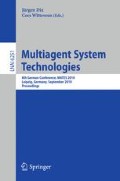Abstract
In open multiagent systems, where agents may join/leave the system at runtime, participants can be heterogeneous, self-interested and may have been built with different architectures and languages. Therefore, in such a type of systems, we cannot assure that agents populating them will behave according to the objectives of the system. To address this problem, organisational abstractions, such as roles and norms, have been proposed as a promising solution. Norms are often coupled with penalties and rewards to deter agents from violating the rules of the system. But, what happens if a current population of agents does not care about these penalties/rewards. To deal with this problem, we propose an incentives infrastructure that allows to estimate agents’ preferences, and can modify the consequences of actions in a way that agents have incentives to act in a certain manner. Employing this infrastructure, a desirable behaviour can be induced in the agents to fulfil the preferences of the system.
The present work has been partially funded by the Spanish Ministry of Education and Science under projects TIN2006-14630-C03-02 (FPI grants program) and “Agreement Technologies” (CONSOLIDER CSD2007-0022, INGENIO 2010).
Access this chapter
Tax calculation will be finalised at checkout
Purchases are for personal use only
Preview
Unable to display preview. Download preview PDF.
References
Esteva, M., Rodriguez, J., Sierra, C., Garcia, P., Arcos, J.: On the formal specification of electronic institutions. In: Sierra, C., Dignum, F.P.M. (eds.) AgentLink 2000. LNCS (LNAI), vol. 1991, pp. 126–147. Springer, Heidelberg (2001)
Dignum, V., Vazquez-Salceda, J., Dignum, F.: OMNI: Introducing social structure, norms and ontologies into agent organizations. In: Bordini, R.H., Dastani, M.M., Dix, J., El Fallah Seghrouchni, A. (eds.) PROMAS 2004. LNCS (LNAI), vol. 3346, pp. 181–198. Springer, Heidelberg (2005)
DeLoach, S., Oyenan, W., Matson, E.: A capabilities-based theory of artificial organizations. J. Autonomous Agents and Multiagent Systems 16, 13–56 (2008)
Esteva, M., Rosell, B., Rodríguez-Aguilar, J., Arcos, J.: AMELI: An agent-based middleware for electronic institutions. In: Proc. of AAMAS, vol. 1, pp. 236–243 (2004)
Centeno, R., Billhardt, H., Hermoso, R., Ossowski, S.: Organising mas: A formal model based on organisational mechanisms. In: Proc. of SAC, pp. 740–746 (2009)
Bellman, R.: Dynamic Programming. Princeton University Press, Princeton (1957)
Keeney, R., Raiffa, H.: Decisions with Multiple Objectives: Preferences and Value Tradeoffs. Cambridge University Press, Cambridge (1993)
Boutilier, C., Patrascu, R., Poupart, P., Schuurmans, D.: Regret-based utility elicitation in constraint-based decision problems. In: Proc. of IJCAI, pp. 929–934 (2005)
Watkins, C.: Learning from Delayed Rewards. PhD thesis, King’s College, Cambridge, UK (1989)
Zhang, H., Parkes, D.: Value-based policy teaching with active indirect elicitation. In: Proc. of AAAI, pp. 208–214. AAAI Press, Menlo Park (2008)
Dufton, L., Larson, K.: Multiagent policy teaching. In: Proc. of AAMAS 2009 (2009)
Author information
Authors and Affiliations
Editor information
Editors and Affiliations
Rights and permissions
Copyright information
© 2010 Springer-Verlag Berlin Heidelberg
About this paper
Cite this paper
Centeno, R., Billhardt, H., Ossowski, S. (2010). Inducing Desirable Behaviour through an Incentives Infrastructure. In: Dix, J., Witteveen, C. (eds) Multiagent System Technologies. MATES 2010. Lecture Notes in Computer Science(), vol 6251. Springer, Berlin, Heidelberg. https://doi.org/10.1007/978-3-642-16178-0_8
Download citation
DOI: https://doi.org/10.1007/978-3-642-16178-0_8
Publisher Name: Springer, Berlin, Heidelberg
Print ISBN: 978-3-642-16177-3
Online ISBN: 978-3-642-16178-0
eBook Packages: Computer ScienceComputer Science (R0)

